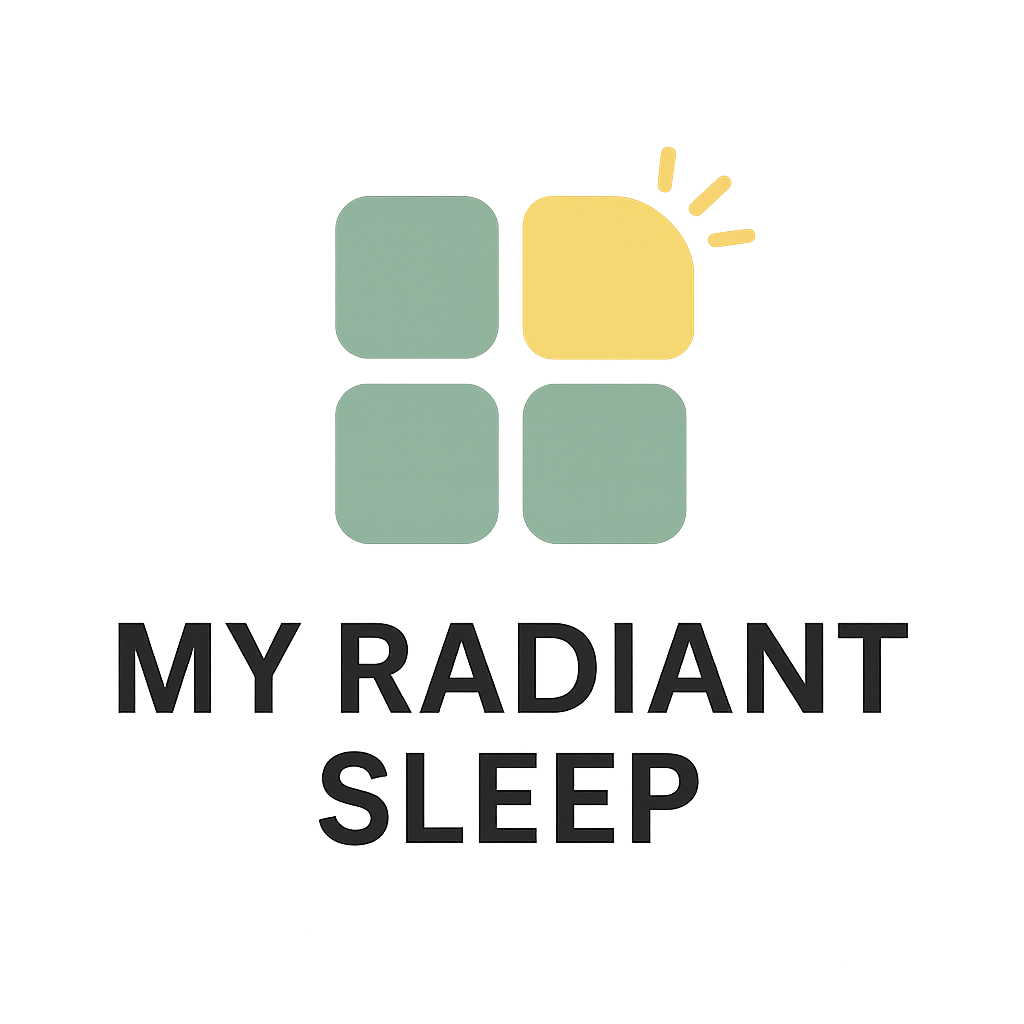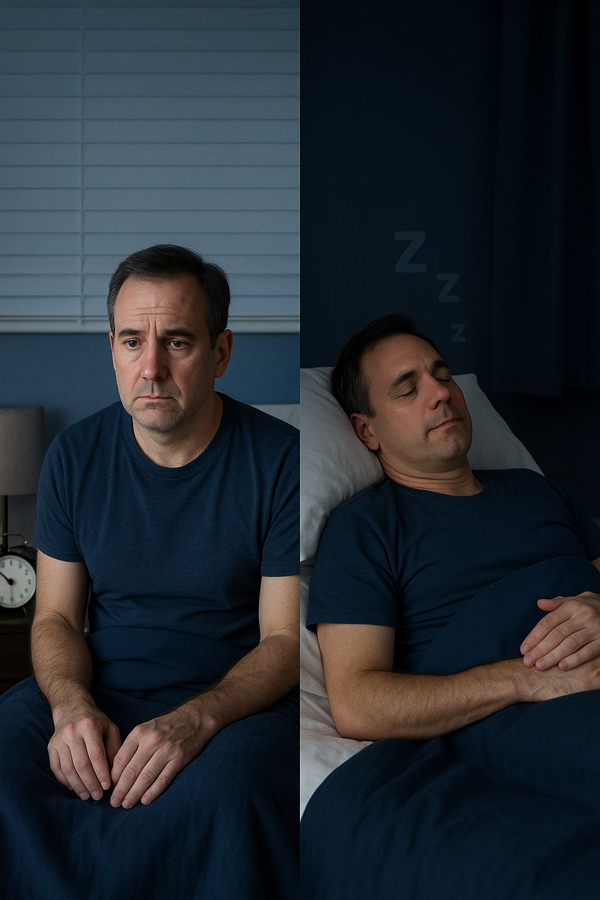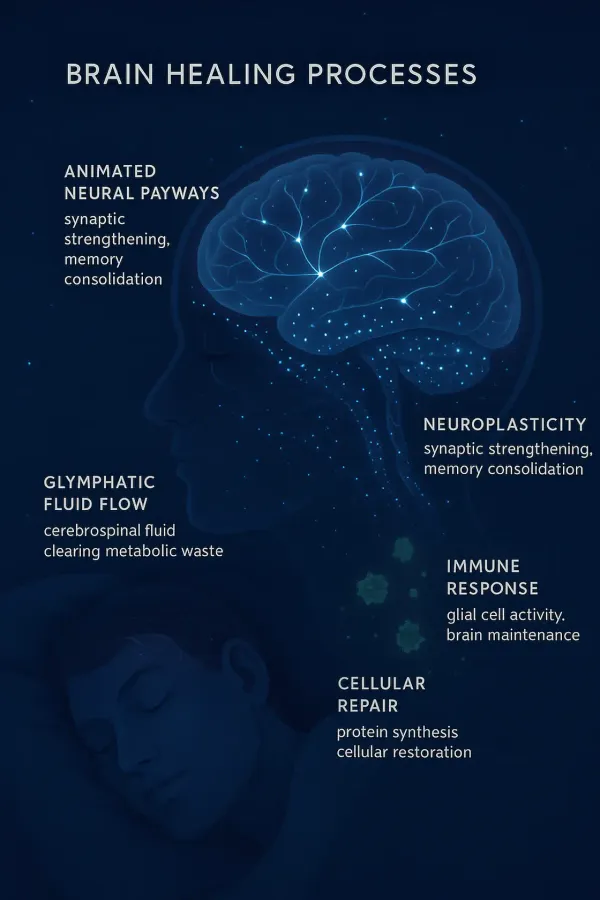This post contains affiliate links. If you purchase through these links, we may earn a small commission at no additional cost to you. See our Terms & Conditions.
Ever woken up after what seemed like a perfect long sleep, only to clutch your head and groan, “Why do I have a headache?” If so, you’re not alone. Many people experience headaches after oversleeping, and it’s not just an annoying coincidence — there are real biological reasons behind it.
In this post, we’ll explore how much sleep is too much, why too much rest can trigger migraines or tension headaches, and most importantly, how to prevent these painful wake-up calls.
I will cover the science of sleep and headaches, break down the main causes, explore risk factors, and offer actionable, evidence-based solutions.
The Science Behind Sleep and Headaches
The Sleep-Headache Connection
Many factors contribute to the relationship between sleep and headaches, so individual differences are important. Oversleeping has also been linked to serious health issues like diabetes, heart disease, and obesity.
Your brain and body are connected during sleep. According to the American Migraine Foundation, sleep affects the nervous system, which governs pain pathways.
- Sleeping too much or too little can disrupt the nervous system.
- These disruptions often cause changes in blood flow, leading to associated headaches.
- Circadian rhythm disorders can interfere with normal sleep patterns and contribute to headaches.
- Headache disorders such as migraines and tension headaches are frequently linked to poor or irregular sleep.
- Your brain is like a complex control center that requires routine maintenance—oversleeping disrupts this balance, increasing the risk of headaches.
Sleep disturbances can stimulate blood flow changes and impact how much oxygen reaches the brain. This disruption can trigger chronic headaches, especially when paired with irregular sleep patterns or sleep disorders.
Understanding the biological reasons behind sleep can shed light on how oversleeping disrupts brain chemistry and contributes to headaches.
How Much Sleep Is Too Much?

The National Sleep Foundation recommends 7–9 hours for most adults. Sleeping more than this can increase the likelihood of headaches.
- Sleeping outside the 7–9 hour range can throw your body out of balance, like a car running on too little or too much fuel.
- Oversleeping can disrupt blood flow, oxygen levels, and neck alignment, increasing tension and pressure.
- Tense neck muscles and poor positioning make it harder for the body to relax and ease headache pain.* Poor sleep quality affects brain function, causing blood flow imbalances that can trigger or worsen headaches.
- Chronic insomnia limits body recovery, leading to recurring headaches and fatigue.
Reduce evening screen strain with Cyxus Blue Light Glasses, designed to block UV and blue light and support melatonin for easier, faster sleep.
- It's important to seek professional help if you're experiencing sleep-related headaches. A sleep medicine specialist can assess your oxygen needs and help restore a healthy sleep balance, which can significantly reduce the frequency and severity of your headaches.
Maintaining a consistent sleep schedule is crucial for preventing headaches. Sleeping too little or too much can affect hormone balance and brain chemistry, increasing the risk of regularly waking with discomfort or tension.
Support better sleep routines for kids with the Hatch Rest 2nd Gen, a smart sound machine, night light, and time-to-rise alarm all in one.
Neurological Mechanisms
As Verywell Health explains, prolonged or disrupted sleep alters neurotransmitters, such as serotonin, which regulate pain and mood. When these levels shift abnormally, it can trigger migraines or cluster headaches. It’s not just about feeling foggy after too much sleep — your brain’s delicate chemical balance is thrown off, making you more sensitive to pain signals.
REM sleep is crucial for true restful sleep and preventing headaches, as disruptions in REM sleep can impede neurological recovery.
Insomnia as a sleep disorder: Insomnia means the brain does not fully enter REM sleep, resulting in reduced sleep quality and increased risk of headaches and migraines."
. Sleep apnea can also reduce the amount of oxygen reaching the brain during sleep, leading to disrupted REM sleep and headaches upon waking.
Oversleeping can interfere with core sleep stages, reducing your brain’s opportunity to fully recover.”
Primary Causes of Oversleep Headaches

Sleep Cycle Disruption
When you oversleep, you disrupt your body’s internal clock, also known as the circadian rhythm. According to Healthline, this disruption affects hormone production. The result? You might experience headaches just from shifting your routine by a few hours.
Neurotransmitter Imbalances
Your nervous system relies on steady neurotransmitter activity. As the Cleveland Clinic notes, fluctuations in serotonin and dopamine levels can cause tension headaches or exacerbate underlying migraine disorders. It’s like a seesaw; too much time on one side (sleep) throws off the balance.
Wake gently with the Philips Wake-Up Light HF3505/01, a sunrise simulation alarm clock with natural sounds and radio designed for smoother mornings.
Blood Sugar Fluctuations
Long periods without food during oversleeping can cause blood sugar dips. Vinmec explains that low glucose levels deprive the brain of the energy it needs, potentially triggering recurring headaches upon waking. This is why breakfast truly is the most important meal — your brain needs fuel after a long fast.
Dehydration Factors
When you sleep too long, you miss out on regular hydration cues. As WebMD points out, even mild dehydration can reduce blood flow to the brain, causing blood vessels to constrict and leading to headaches. Think of it like a garden hose that’s pinched: less flow, more pressure.
Oversleeping affects serotonin levels, posture, and hydration. These are leading causes of head pain, with numerous factors like blood sugar drops, muscle tension, and poor sleep alignment playing major roles.
Explore bedding accessories that enhance comfort and support better sleep posture to minimize headache risks.
Morning Headaches: Why They Happen
They’re often linked to sleep disorders like sleep apnea and irregular sleep habits that disrupt your body’s natural sleep cycle. When your sleep is fragmented or you don’t get the recommended hours of sleep per night, your risk of morning headaches increases.
According to the National Sleep Foundation, most adults should aim for 7-9 hours of sleep to support a healthy sleep cycle and reduce the likelihood of waking up with a headache.
Poor sleep habits, such as inconsistent bedtimes or frequently changing your sleep schedule, can throw off your body’s internal clock, making morning headaches more likely. Understanding these connections is the first step to managing and preventing those unwanted wake-up calls.
If you suspect sleep apnea as the reason for your morning headaches, consider using one of these top sleep apnea monitors. These devices can help you track nighttime breathing patterns and manage morning headaches more effectively, giving you the knowledge and tools to take control of your health.
If sleep apnea is suspected as a cause of your morning headaches, consider using one of these top sleep apnea monitors to track breathing disruptions.
Common Triggers After Oversleeping
Oversleeping—whether it’s sleeping in on weekends or dozing off for long naps—can disrupt your natural sleep cycle and set the stage for morning headaches.
Sleep disorders like insomnia and sleep apnea are also major culprits, as they can lead to poor sleep quality and the urge to sleep longer than necessary.
Poor sleep habits, such as irregular sleep schedules, lack of physical activity, or using sleeping pills and alcohol to fall asleep, can increase your risk even more.
These substances may help you fall asleep initially, but often result in fragmented or excessive sleep, which can trigger headaches upon waking. Additionally, high stress levels, mood disorders, and other underlying health conditions can make you more prone to morning headaches.
Identifying your triggers—whether it’s sleeping too much, unmanaged stress, or an undiagnosed sleep disorder—is key to finding solutions.
If your sleep quality is poor despite long hours in bed, these mattress recommendations for sleep disorders might help.
How Morning Headaches Differ from Other Types
Morning headaches are unique in timing, cause, and symptoms. Here’s how they differ:
- They typically begin immediately after waking and can involve symptoms such as fatigue, nausea, or light sensitivity.
- Often linked to sleep issues like sleep apnea, poor blood flow, or low oxygen during sleep.
- Tension headaches stem from muscle strain and improve when you relax tense muscles or adjust your sleep position.
- Migraine attacks may result from oversleeping or disruptions in your sleep schedule, making sleep a common migraine trigger.
- Cluster headaches strike in cycles, sometimes waking you from sleep.
- Waking with pain and excessive sleepiness may signal teeth grinding or hidden sleep disorders.
- Morning headaches are a leading cause of poor focus and may require medical attention to manage effectively.
Follow these top sleep tips to improve your nighttime routine and avoid oversleeping-related discomfort.
Risk Factors and Contributing Conditions
Several underlying issues can worsen or trigger migraines and associated headaches:
- Sleep disorders like insomnia and sleep apnea disrupt sleep and lead to oversleeping, increasing the risk of waking with pain.
- Depression often causes both insomnia and oversleeping, forming a vicious cycle that amplifies headaches and fatigue.
- Certain medications, including sleeping pills, antidepressants, and pain relievers. As Healthline points out, they may increase drowsiness and lead to either more or less sleep than needed, as well as an increased risk of headaches.
- Mental health struggles, fragmented sleep, and chronic stress can all intensify symptoms without proper disease control.
- Poor sleep hygiene, inconsistent schedules, and screens before bed. As the American Migraine Foundation explains, improving sleep hygiene reduces the risk of trigger migraines and other associated headaches.
Medication Side Effects
Certain medications, including sleeping pills, antidepressants, and pain relievers, can alter sleep architecture. As Healthline points out, they may increase drowsiness and lead to either more or less sleep than needed, as well as an increased risk of headaches.
Lifestyle Factors
Poor sleep hygiene, irregular schedules, excessive screen time, and late-night meals can all disrupt sleep. As the American Migraine Foundation explains, improving sleep hygiene reduces the risk of trigger migraines and other associated headaches.
The Vivilumens Sunrise Alarm Clock offers dual alarms, white noise, and a gentle light to help heavy sleepers wake more naturally and consistently.
Practical Solutions and Prevention
Sleep Hygiene Best Practices## Tips
Consistency
- Stick to a bedtime and wake-up time, even on weekends.
- Avoid caffeine, alcohol, and heavy meals in the evening.
- Reduce screen time before bed to fall asleep faster.
- Engage in relaxing pre-sleep routines, such as reading or drinking herbal tea.
Sleep Schedule
Maintaining a predictable sleep rhythm aligns your body’s sleep needs with its natural circadian clock. According to the Cleveland Clinic, going to bed and waking at irregular hours can cause regular headaches. Try to go to bed at the same time each night to regulate your sleep schedule. Use alarms, a sleep app, or consult a sleep specialist to help regulate your sleep timing.
Environmental Optimization
- Keep your bedroom cool, quiet, and dark.
- Invest in a supportive mattress and pillow that suits your sleep position.
- Use white noise machines or earplugs if external sounds disturb you.
Ensure your bed supports proper neck alignment to relax tense muscles.
Preventing Morning Headaches

Monitor sleep, heart rate, and oxygen levels with the Amazfit Bip 5 Smart Watch, an AI-powered tracker with Alexa and 10-day battery life.
To prevent morning headaches, take a holistic approach that supports both sleep quality and overall health:
- Follow a consistent sleep schedule to regulate your internal clock and reduce your risk of headaches.
- Create a sleep-friendly space by keeping the room cool, dark, and quiet, and limit screen time before bed.
- Practice good sleep hygiene using deep breathing, meditation, or stretches to relax tense muscles.
- Stay active and eat a balanced diet to support more restorative sleep.
- If headaches persist, consult a sleep specialist or healthcare provider to rule out underlying conditions, such as sleep apnea.
With the right habits and support, you can manage and prevent morning headaches, waking up clearer, calmer, and more refreshed.
The wrong sleep surface can exacerbate pain—learn how your mattress impacts sleep and overall health.
When to Seek Medical Help
If headaches persist despite lifestyle changes, see a professional. Monitor your blood pressure if you experience frequent headaches, as abnormal blood pressure readings can indicate underlying health issues. High blood pressure can be a symptom or a risk factor for headaches and should be checked by a healthcare professional.
According to Verywell Health, chronic cluster headaches and headaches accompanied by other symptoms, such as vision changes or weakness, may indicate underlying medical conditions.
Oversleeping and headaches may also be linked to increased risk of heart disease, so persistent symptoms should be discussed with a healthcare provider. Don’t self-treat; talk to your doctor to rule out serious causes.
Replace your phone with the Loftie Smart Alarm Clock, featuring blackout mode, white noise, and 100+ relaxing sounds for screen-free, restful nights.
How to Prevent Morning Headaches from Oversleeping
- Stick to a consistent sleep schedule every day.
- Avoid caffeine and screen exposure before bedtime.
- Use a sunrise alarm clock to wake gradually.
- Hydrate and stretch shortly after waking up.
- Consult a doctor if morning headaches continue.
How to Reset Your Sleep Schedule
- Go to bed and wake up at the same time daily.
- Limit daytime naps to no more than 30 minutes.
- Get early-morning sunlight to help regulate melatonin.
- Avoid heavy meals or intense exercise late at night.
- Use blue-light filters or glasses in the evening.
When to See a Healthcare Provider

If you experience chronic headaches, disrupted sleep, or concerning symptoms, see a doctor immediately. Medical help ensures accurate diagnosis and proper treatment, especially when disease control or a sleep disorder is needed.
Warning Signs Requiring Medical Attention
Seek medical advice if you experience:
- Head injury recurring headaches are a serious warning sign, especially if the pain is sudden or severe. Seek immediate medical attention if headaches persist after trauma.)
- Headaches with fever, stiff neck, or confusion
- Headaches that worsen over time
- Headaches that disrupt daily activities or sleep quality
As the Cleveland Clinic emphasizes, these symptoms may indicate serious conditions that require prompt evaluation and attention.
Types of Specialists to See
You may be referred to:
- A neurologist for migraines or nerve-related headaches
- A sleep specialist if sleep disorders like apnea are suspected
- A primary care doctor for general evaluation and management
Recurring headaches, especially after a head injury, or those with migraine symptoms or other mood disorders, need to be evaluated by a healthcare provider. A sleep medicine specialist can help diagnose whether disrupted sleep or a neurological issue is to blame.
Getting a good night’s sleep is important, but oversleeping can backfire and cause headaches. Instead of easing pain, excess rest can disrupt brain chemistry. Practicing consistent sleep hygiene helps control disease and prevents rebound headaches from irregular sleep patterns.
Disclaimer: This content is for informational purposes only and is not a substitute for professional medical advice, diagnosis, or treatment. If you are experiencing concerning symptoms or ongoing health issues, please consult a qualified healthcare provider immediately.
Conclusion
Sleep offers numerous health benefits, but excessive sleep can lead to tension headaches or migraines due to disruptions in the sleep cycle, shifts in neurotransmitters, and physical strain.
Practicing good sleep hygiene, maintaining a regular sleep and wake schedule, and seeking medical support when needed can help break the cycle of oversleep-related headaches.
The key is balance—understand your sleep needs, pay attention to your body\u2019s signals, and focus on getting quality rest over quantity.
If you found this guide helpful, you can bookmark it and share it with others who might benefit. Together, we can all aim for better, pain-free sleep!
FAQs
Can oversleeping cause headaches?
Getting too much sleep can lead to headaches, as it disrupts serotonin balance, alters blood circulation, and causes muscle strain in the neck and shoulders. These effects may cause migraines or tension headaches, particularly in those with inconsistent sleep routines or sleep disorders like apnea.
What are the symptoms of oversleep?
Symptoms of oversleep include drowsiness, headaches, low energy, mood swings, and difficulty concentrating. Oversleeping can also lead to disrupted nighttime sleep, neck stiffness, and an overall feeling of fatigue. In some cases, it can contribute to depression, back pain, or blood sugar fluctuations.
Is it okay to sleep 12 hours a day?
Sleeping 12 hours occasionally may be fine after physical exertion or illness. But sleeping that much consistently can mean underlying conditions like hypersomnia, depression, or poor sleep quality. If long sleep durations leave you feeling groggy or unrested, consider consulting a healthcare provider or a sleep specialist.
How to get rid of an overslept headache?
To ease an overslept headache, drink plenty of water, get outside light exposure, do light movement or stretching, and skip extra naps. Applying a cold pack or having a small amount of caffeine can also help. If pain continues, refine your sleep habits and explore possible triggers like posture or sleep apnea.
REFERENCES
American Migraine Foundation. (n.d.). Sleep and migraines. https://americanmigrainefoundation.org/resource-library/sleep/
Cleveland Clinic. (n.d.). Why you’re waking up with a headache? https://health.clevelandclinic.org/waking-up-with-a-headache
Healthline. (n.d.). Headache from oversleeping: Causes and how to prevent them. https://www.healthline.com/health/headache-from-oversleeping
Rains, J. C., Poceta, J. S., Penzien, D. B., Rapoport, A. M., & Bajwa, Z. H. (2017). Sleep and headaches: Clinical review and expert consensus. Chest, 152(4), 834–846. https://pmc.ncbi.nlm.nih.gov/articles/PMC5605773/
Sleep Foundation. (n.d.). Morning headaches: What you need to know. https://www.sleepfoundation.org/physical-health/morning-headaches
University Hospitals. (2025, January). Why you may be waking up with a headache. https://www.uhhospitals.org/blog/articles/2025/01/why-you-may-be-waking-up-with-a-headache
Verywell Health. (n.d.). Morning headaches and obstructive sleep apnea. https://www.verywellhealth.com/obstructive-sleep-apnea-am-headaches-3014738
Vinmec International Hospital. (n.d.). Headache from sleeping too much. https://www.vinmec.com/eng/blog/headache-from-sleeping-too-much-en
WebMD. (n.d.). Physical side effects of oversleeping. https://www.webmd.com/sleep-disorders/physical-side-effects-oversleeping







